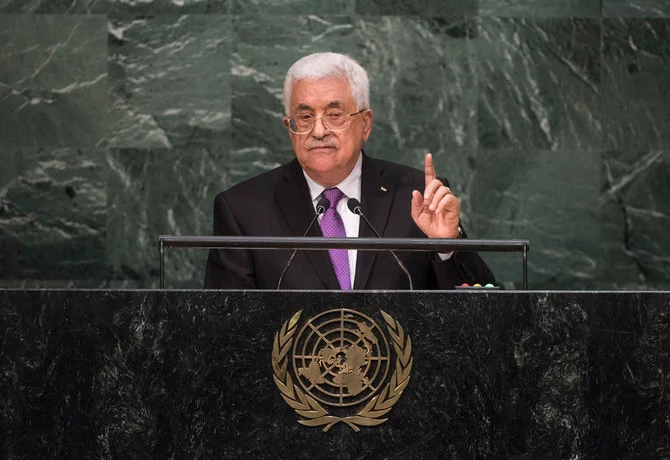
- ARAB NEWS
- 01 Jul 2025

The issue of Palestine will once again be front and center at the 77th session of the UN General Assembly. Palestinian President Mahmoud Abbas, who last year gave the world community 12 months to help realize a Palestinian state, will push for the UN Security Council to recognize Palestine as a full member state under occupation. He said last year: “The Israeli authorities have one year to withdraw from the Palestinian territory it occupied in 1967, including East Jerusalem.”
The first day of the high-level general debate in New York will be Tuesday, Sept. 20, and many will be repeating without any genuine seriousness the term “two-state solution.”
The Palestinian permanent mission to the UN will be pushing the Security Council to vote on what the mission’s representative, Riyad Mansour, calls a “practical initiative” to save the two-state solution. Mansour is confident that the Palestinian proposal will receive more than the needed nine positive votes from the council’s 15 member states, but it is still unclear how the US ambassador, who has veto power, will vote. Most members of the UNSC have previously voted in favor of the state of Palestine at the level of the General Assembly. A total of 13 European states did so, three of which — Albania, Norway and Ireland — are currently members of the UNSC. India, Brazil and the UAE are also on record as supporting the state of Palestine.
The Palestinian resolution will be a step back from last year’s demand that Israel withdraws from the Occupied Territories, as it is simply calling for Palestine to be recognized as a full member state, even if it is under occupation.
According to the General Assembly Rules of Procedure, the general debate is to be held without interruption for nine working days. However, in practice, seven days is usually sufficient to accommodate all speakers. Abbas will again speak to the UN plenary. Many expect that this might be the last speech the 87-year-old leader makes at the august assembly. Abbas’s own faction, Fatah, is planning its eighth congress before the end of 2022. At this event, the strategies, policies and tactics of the Palestinian movement, as well as its senior personnel, will become clear.
The absence of a political horizon has been the single most powerful cause of the increase in violent attacks in the Occupied Territories.
Daoud Kuttab
Abbas has been a relentless advocate of a peaceful negotiated solution to the Palestinian-Israeli conflict. Those who might take his place are not necessarily committed to this singular approach. While it is unlikely that a revolutionary leader will emerge and insist on a violent approach, whatever policies and leaders are chosen will most likely be less protective of the Israelis and not as committed to the security coordination that has been the hallmark of the Palestinian leadership ever since Abbas signed, along with the late Shimon Peres, the Declaration of Principles on the White House Lawn in September 1993.
The single most destructive statistic since that date relates to the mushrooming number of illegal settlements and settlers in the Occupied Territories. The number of Jewish settlers has tripled and Palestinian land has been confiscated. As a result, the area between the sea and the river has clearly become an area where the war crime of apartheid has been documented to be the rule, rather than the exception.
Although the Biden administration has made it clear to the Palestinians it will veto the resolution, it will be much more difficult politically than simply raising a hand in opposition to the initiative.
While the US is much more interested in a deal with Iran and in its relations with the Arab Gulf countries, the issues surrounding Palestine and Israel will not go away. The Biden administration is having a hard time getting the Israelis to even investigate the killing of American citizen and well-known TV journalist Shireen Abu Akleh. The current Israeli government’s refusal to even engage Palestinians politically has also frustrated Washington’s attempts to appear to be an honest broker. Biden was forced during his recent visit to Bethlehem to admit that the time is “not ripe” for negotiations.
The absence of a political horizon has been the single most powerful cause of the uptick in violent attacks in the Occupied Territories. Israeli policy is centered on the claim that almost every Palestinian who opposes its rule is a terrorist, even if they are legitimate, internationally recognized human rights organizations or a UN humanitarian hero, such as Mohammad El-Halabi, or simply individuals who insist on their right to resist occupation and an illegal colonial settlement enterprise.
The US’ opposition sounds hollow, as it provides billions of dollars to Ukrainian resisters yet threatens to veto a “practical initiative” by Palestinians that aims to keep the two-state solution alive. America’s foreign policy credibility will again be on the line when the Security Council meets to consider the initiative to recognize the state of Palestine on the June 4, 1967, borders as a full member of the UN.